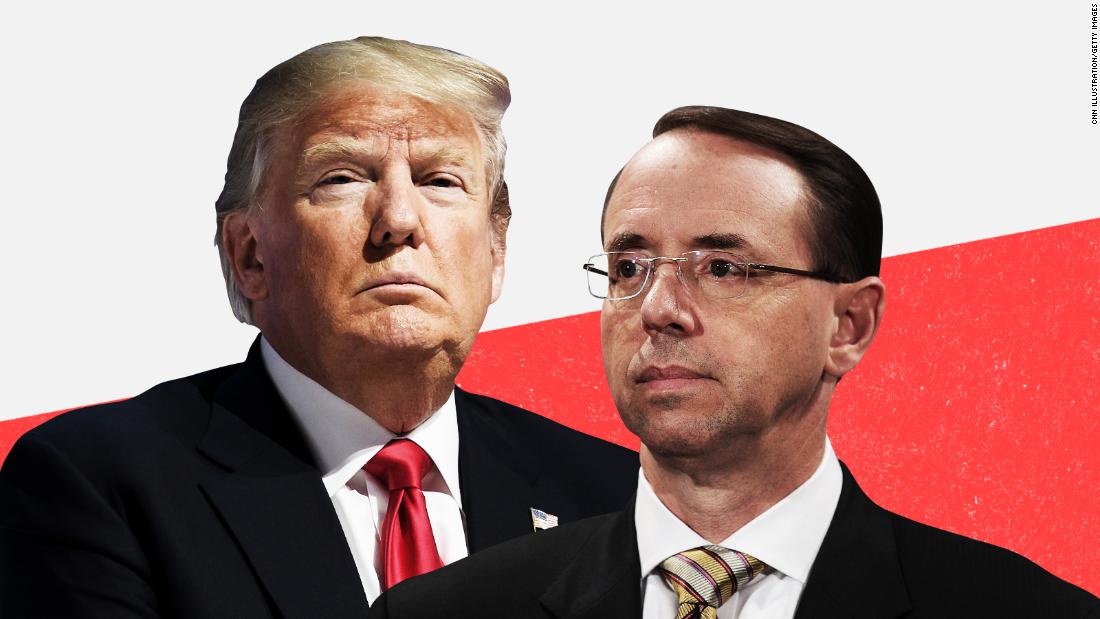
FBI Director Christopher Wray publicly clashed with President Donald Trump on Tuesday over a controversial Republican intelligence memo, furthering the rift between the President and the agency investigating ties between his campaign and Russia.
Wray sent a striking signal to the White House, issuing a rare public warning that the memo about the FBI’s surveillance practices omits key information that could impact its veracity. The move set up an ugly confrontation between Wray and Trump, who wants the document released.
“With regard to the House Intelligence Committee’s memorandum, the FBI was provided a limited opportunity to review this memo the day before the committee voted to release it,” the FBI said in a statement. “As expressed during our initial review, we have grave concerns about material omissions of fact that fundamentally impact the memo’s accuracy.”
The dire warning stood in direct contrast to Trump, who has told his associates he wants the memo released to ensure full transparency. Earlier Wednesday, White House chief of staff John Kelly predicted the memo would be released “pretty quick” and that “the whole world will see it.” Trump himself was overheard telling a Republican congressman after the State of the Union address on Tuesday he will “100%” release the memo.
The FBI’s unusual public warning came after two days of private meetings between top Justice Department and White House officials, where the FBI’s entreaties to withhold the memo went largely unheeded by Trump’s aides.
Officials from the Justice Department and FBI went to the White House on Tuesday to make a renewed effort to explain certain inaccuracies they see in the Nunes memo, according to a source familiar with the discussions. The effort came a day after Deputy Attorney General Rod Rosenstein and Wray made similar overtures to Kelly to delay a House Intelligence Commitee vote on releasing the memo.
Raising concerns
Law enforcement and intelligence agencies have raised concerns about the potential public release of the document, composed by the staff of Republican Congressman Devin Nunes of California. Those agencies have said the memo contains inaccuracies and does not paint a full picture of how the surveillance process works, according to two law enforcement sources.
Nunes, who was traveling Wednesday with fellow congressional Republicans aboard a train when it crashed into a dump truck, decried the FBI’s public rebuke.
“Having stonewalled Congress’ demands for information for nearly a year, it’s no surprise to see the FBI and DOJ issue spurious objections to allowing the American people to see information related to surveillance abuses at these agencies,” Nunes said in a statement.
Asked about the FBI’s statement during an Oval Office meeting with American taxpayers, Trump declined to respond.
The memo, which is currently being reviewed in a secure room at the White House, claims the FBI abused the Foreign Intelligence Surveillance Act over its use of the opposition research dossier on Trump and Russia as part of the case to obtain a highly classified warrant on former Trump campaign foreign policy adviser Carter Page, people familiar with the document say.
Democratic detractors claim the memo is an attempt to discredit officials overseeing special counsel Robert Mueller’s investigation into alleged Trump campaign connections to the Russian meddling in the 2016 election. The investigation has moved increasingly closer to Trump’s inner circle, with a series of indictments handed down over the past two months.
Questions have also mounted about the White House’s own role in creating the document. Trump’s spokeswoman said Wednesday morning she didn’t know whether any West Wing aides were involved in the memo’s production.
“We have certainly coordinated with members of Congress as is appropriate. As to specifics on this, I just don’t know the answer,” press secretary Sarah Sanders said on CNN’s “New Day.” “I’m not aware of any conversations or coordination with Congressman Nunes.”
During the House Intelligence Committee’s business meeting on Monday to vote on releasing the Nunes memo, Illinois Democratic Rep. Mike Quigley pressed Nunes, the committee’s chairman, about whether he or his staff had coordinated with the White House on the memo, according to a transcript of the meeting released on Wednesday.
“I would just answer, as far as I know, no,” Nunes responded when asked whether he’d coordinated with the White House on the memo.
Quigley said Nunes became “quite agitated” when pressed whether any of his staffers were involved in producing the memo and refused to answer the question.
“The chair is not going to entertain a question by another member,” Nunes said, according to the transcript.
Democratic suspicions that Nunes has coordinated with the White House stem from last year, when he took a secret trip to the White House to review intelligence gathered by two White House staffers about the “unmasking” of Trump’s team in foreign intelligence collected during the Obama administration. Nunes then briefed Trump about his findings, despite the information coming from the White House.
The whole episode ultimately led to Nunes temporarily stepping aside as leader of the House Intelligence Committee’s Russia investigation amid an Ethics Committee investigation over whether he revealed classified information. Nunes was cleared by the committee in December.
Growing rift
Ahead of the FBI’s statement on Wednesday, some Justice Department officials expressed concerns about publicly opposing the release of the memo, according to multiple officials. Trump had already been angered by a letter the Justice Department sent the House Intelligence Committee last week warning the release would be “extraordinarily reckless.” The FBI issued the statement Wednesday anyway.
The memo also faces deep opposition inside intelligence agencies, multiple current and former intelligence officials tell CNN. The intelligence community’s concerns are rooted in a fear that disclosing details of the FISA warrant process could reveal crucial elements of intelligence gathering, potentially causing foreign intelligence targets to change behavior to avoid surveillance in the future.
As reported by CNN
